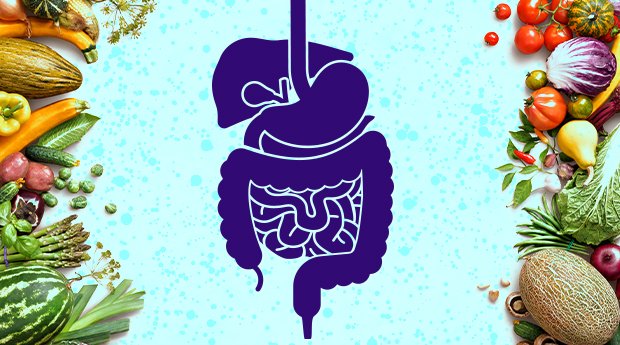How to Take Care of Digestive Health

The digestive system of our body breaks down the foods we eat into the nutrients our body needs. If you neglect your digestive health, your body could run into problems absorbing those essential nutrients.
The foods you eat and the lifestyle you live have a direct impact on your digestive health. Taking steps to improve your digestive health can help your digestive system function more efficiently and improve your overall health and sense of well-being.
Food's journey through the digestive system begins in the mouth. It passes down the oesophagus and into the stomach, where digestion begins. Next stop: the small intestine, which in the average person is more than 20 feet long. The small intestine further breaks down food, absorbs nutrients, and sends them into the bloodstream.
The remaining watery food residue moves into your large intestine, a muscular tube about 4 feet long. As undigested food passes through it, bacteria feed off the remnants. The wall of the large intestine soaks up most of the remaining water. Any undigested food that remains is expelled by a highly efficient disposal system.
Like all complicated machinery, the digestive tract doesn't always run smoothly. In some people, the problem is genetic. In others, the immune system mistakenly attacks the digestive system, causing various digestive woes. What we eat, and how we eat, can also throw off digestive health.
Common ailments of the digestive system include:
- heartburn, also known as gastroesophageal reflux disease (GERD)
- peptic ulcer
- diverticular disease
- irritable bowel syndrome (IBS)
- gallstones
- celiac disease
- constipation
- diarrhoea
Try incorporating these strategies into your daily life to keep things running smoothly:
Eat a high-fibre diet.
According to Maria Adams, MS, MPH, RDN, owner of Halsa Nutrition and adjunct professor of nutrition at Endicott College in Beverly, Massachusetts, consuming a high-fibre diet that's rich in whole grains, vegetables, fruits, and legumes can improve your digestive health. "A high-fibre diet helps to keep food moving through your digestive tract, making you less likely to get constipated," Adams says, adding that a high-fibre diet can also help you prevent or treat various digestive conditions, such as diverticulosis, haemorrhoids, and irritable bowel syndrome (IBS). In addition, it can help you achieve or maintain a healthy weight.
Get both insoluble and soluble fibre.
It's important to consume both types of fibre, since they help your digestive system in different ways. "Insoluble fibre, also known as roughage, can't be digested by the body and therefore helps add bulk to the stools," says Adams. "Soluble fibre draws in water and can help prevent stools that are too watery." Good sources of insoluble fibre include wheat bran, vegetables, and whole grains; you can get soluble fibre from oat bran, nuts, seeds, and legumes.
Limit foods that are high in fat
"In general, fatty foods tend to slow down the digestive process, making you more prone to constipation," says Adams. But since it's important to get some healthy fat in your diet, Adams recommends pairing fatty foods with high-fibre foods to help things move along more smoothly.
Incorporate probiotics and prebiotics into your diet
Probiotics are the same kind of healthy bacteria and yeasts naturally present in your digestive tract. "They help keep the body healthy by combating the effects of a poor diet, antibiotics, and stress," says Adams. In addition, probiotics can enhance nutrient absorption, may help break down lactose, strengthen your immune system, and possibly even help treat IBS. Adams recommends that people eat good sources of probiotics, such as low-fat yogurt or kefir, on a daily basis.
In addition to probiotics, prebiotics can help your digestion as well. Prebiotics act as food for probiotics, helping them support healthy bacteria in the gut, according to the Academy of Nutrition and Dietetics. Prebiotics are found in a variety of raw fruits, vegetables, and whole grains including bananas, oats, onions, and legumes.
Try the low FODMAP diet
Fermentable oligosaccharides, disaccharides, monosaccharides, and polyols (FODMAP) foods, which are types of carbohydrates, can be hard for some people to digest. If you know you have IBS or if you simply deal with symptoms such as abdominal cramping, gassiness, bloating, and diarrhoea — the low FODMAP diet may offer some relief. This diet is meant to be followed for a short period of time to identify which trigger foods you should avoid for easier digestion. Work with a registered dietitian nutritionist (RD or RDN) who specializes in this area to ensure your diet is healthy while you figure out which foods should be eliminated from your diet for good.
Eat on schedule
Adams says that consuming your meals and healthy snacks on a regular schedule can help keep your digestive system in top shape. Aim to sit down for breakfast, lunch, dinner, and snacks around the same time each day.
Stay hydrated
Drinking plenty of water is good for your digestive health, according to Adams. Fibre pulls water into the colon to create softer, bulkier stools, allowing them to pass through more easily.
Skip the bad habits
Smoking, excessive caffeine, and alcohol. Liquor, cigarettes, and too much coffee or other caffeinated beverages can interfere with the functioning of your digestive system and lead to problems like stomach ulcers and heartburn.
Exercise regularly
"Regular exercise helps keep foods moving through your digestive system, reducing constipation," says Adams. Staying active can also help you maintain a healthy weight, which is good for your digestive health. Make it a point to work regular exercise into your weekly schedule.
Manage stress
Too much stress or anxiety can cause your digestive system to go into overdrive, according to Adams. Find stress-reducing activities that you enjoy and practice them on a regular basis.
Over time, everyone’s digestive system works less efficiently and people can develop food intolerance or begin taking medications that can affect digestion. These changes can create problems like gas, bloating, cramps, and constipation. By identifying the reasons for the digestive issues, managing them becomes easier and by taking all the basic necessary steps to take good care of the digestive system can help keep the entire system running smoothly.















































